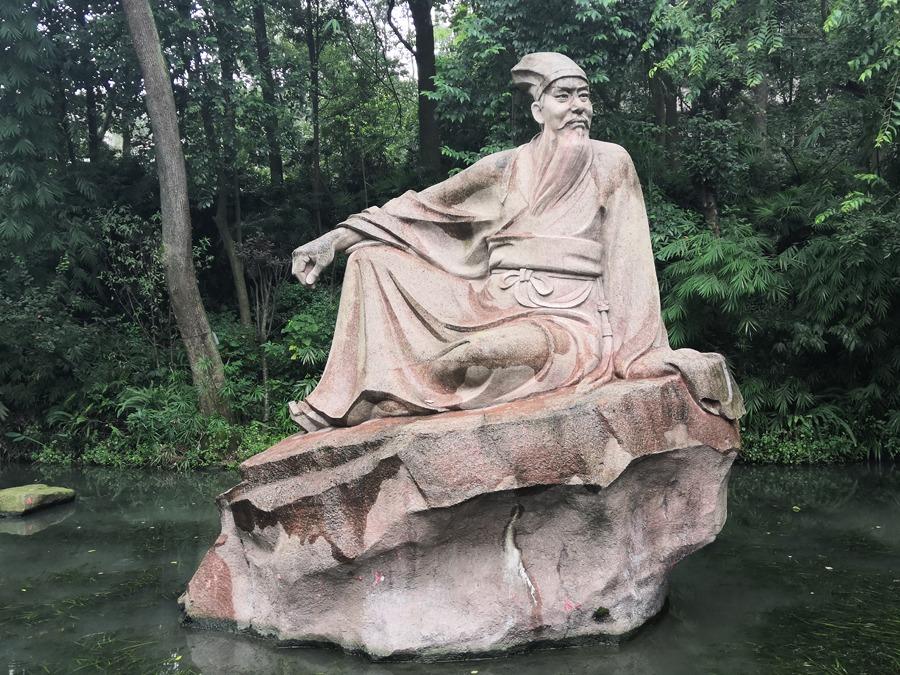 A statue of the Song Dynasty poet Su Dongpo at the Ancestral Temple of the Three Sus in Meishan. (LIU LANYING / FOR CHINA DAILY)
A statue of the Song Dynasty poet Su Dongpo at the Ancestral Temple of the Three Sus in Meishan. (LIU LANYING / FOR CHINA DAILY)
China's 6th national poetry festival opened in Chengdu, Sichuan province, on Sunday, becoming the first national-level cultural festival to be held offline since the start of the COVID-19 pandemic.
The triennial event, launched by the Ministry of Culture and Tourism and the China Writers Association, will feature dozens of activities in Chengdu and Chongqing until Saturday, including stage performances, poetry readings and academic seminars. There will also be activities promoting poetry and traditional Chinese culture at schools, shopping malls, bookstores, residential communities and villages.
"Poetry is the oldest genre of literature and is also the best way to express emotions, and a key bench mark of human civilization," Hu Heping, minister of culture and tourism, said at the opening ceremony on Sunday. "Its significance in nurturing people's sentiment and building up ethos is irreplaceable.
We hope the festival motivates the public to enjoy the poetic life, and that more people will also be encouraged to stick to their ideals and bring us fine works with power and warmth.
Hu Heping, minister of culture and tourism
"We hope the festival motivates the public to enjoy the poetic life, and that more people will also be encouraged to stick to their ideals and bring us fine works with power and warmth."
Actress Zhang Kaili, who is taking part in the festival, said: "Despite the quick rhythm of modern life, poetry cannot be absent. It's the classic ancient poetry, a lasting spiritual legacy, that can nourish people's cultural taste and guide us to go afar."
In the past two decades, Zhang has helped organize over 100 poetry-reading galas across the country promoting classic works from the Tang (618-907) and Song (960-1279) dynasties, the zeniths of ancient Chinese poetry.
Nevertheless, admiration for poetry also needs to catch up with the times, festival attendees said.
"Ancient poems are composed in an outstanding format, holding the finest traditional Chinese culture," said Wang Bing, deputy editor-in-chief of Shikan, a poetry magazine. "And modern Chinese poems, which have been gradually established in the past century, can also continue to make a new contribution to literature.
"We've seen broader global horizons among Chinese poets in the new era," Wang said. "Poets from the grassroots, like factory workers, have also mushroomed, which now makes many previously lesser-seen themes visible."
Though idyllic countryside, nostalgia for hometowns and other classical poetic themes still feature in poets' seminars during the festival, some other sessions highlight how to turn a global perspective of a shared future for mankind and China's recent development into verse.
Poets and artists are also being encouraged to create new works during the festival hailing people's strong spirit during the novel coronavirus outbreak.
ALSO READ: American poet Louise Gluck wins Nobel Prize for Literature
"Chanting poems is always encouraging during wartime and other pivotal moments in history," said Hu Lemin, an artist devoted to promoting the chanting of poetry by the public.
"Poetry is about not only expressing individuals' subtle and sentimental emotions, but also about reflecting a big picture of their time and thus providing people with strength. The COVID-19 outbreak is such a scenario."
During the toughest time in the fight against the virus in Wuhan, Hubei province, earlier this year, Hu released some clips on social media featuring the chanting of hymns for medical workers on the front line that proved popular.
Nevertheless, Hu Lemin said, creative thinking was needed in the long term to bring people back to poetry during normal times.
"Poetry cannot always be that serious. It should be closer to people's need to relax amid a busy life," he said. "But its cultural core cannot be distorted."
READ MORE: Giving life to poetry
In recent years, he has introduced elements from plays, musicals and other stage performance genres into the chanting of poems.
Tourism may be another way.
During the festival, some routes have been recommended by the tourism administrations of Sichuan and Chongqing for poetry fans interested in pilgrimages to honor ancient poets.
For example, during the Tang Dynasty, Li Bai and Du Fu, the two greatest poets of that time, wrote many famous stanzas about and in the two cities, where they lived for a long time.
Numerous heritage sites bearing witness to their footsteps can be found today, and many sites in the two cities have also been mentioned by a plethora of other poets throughout Chinese history.
Chongqing will host the festival's closing ceremony.
Contact the writer at wangkaihao@chinadaily.com.cn


